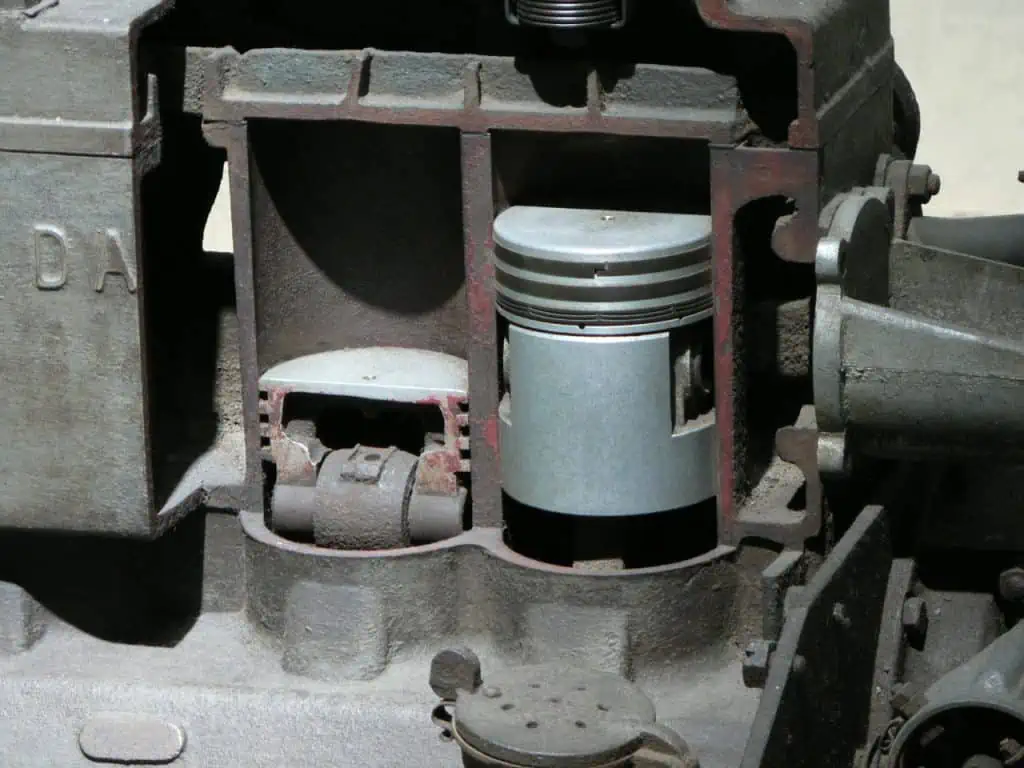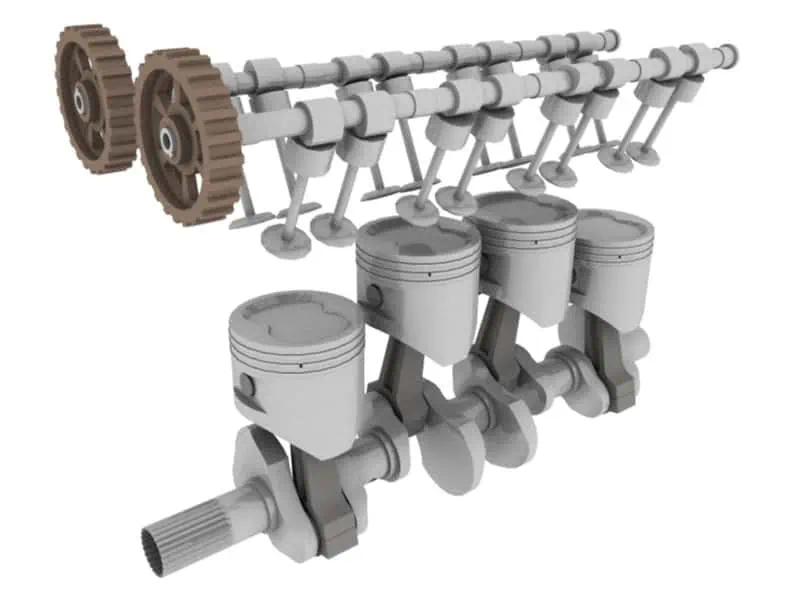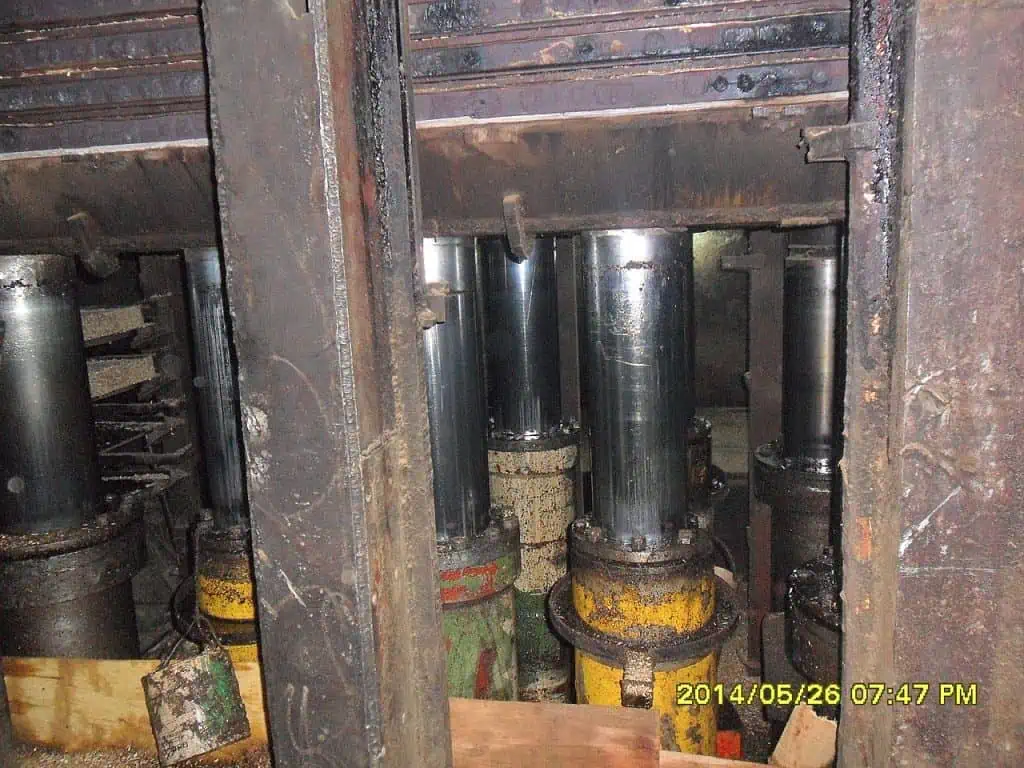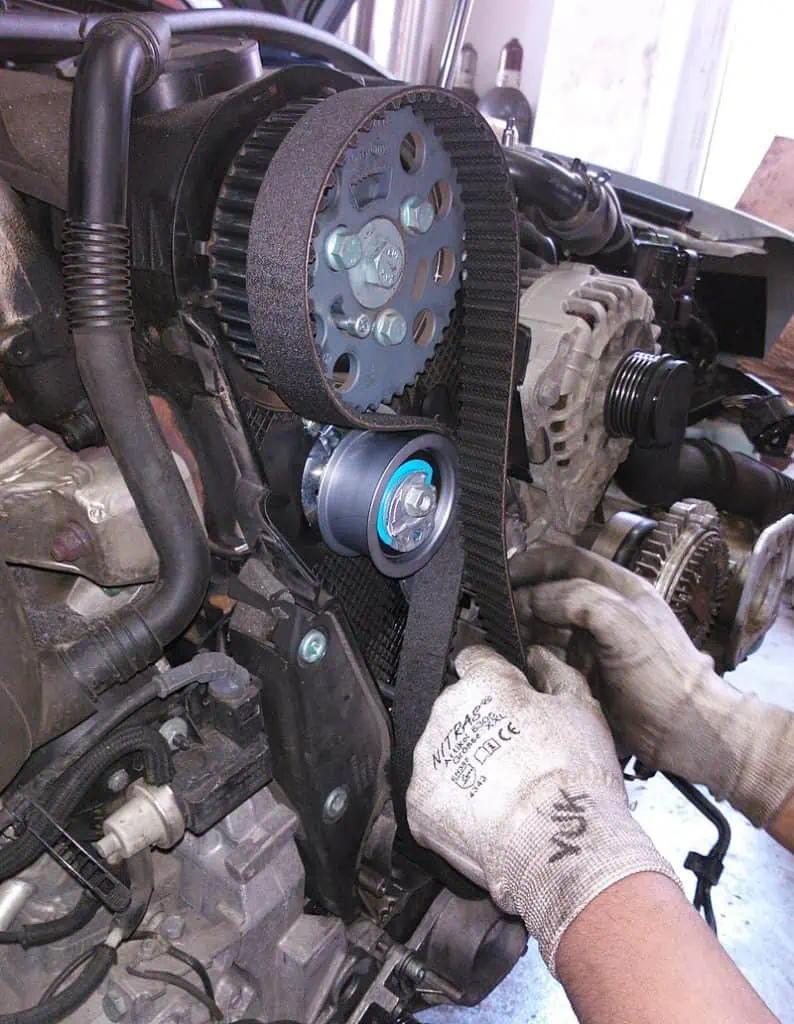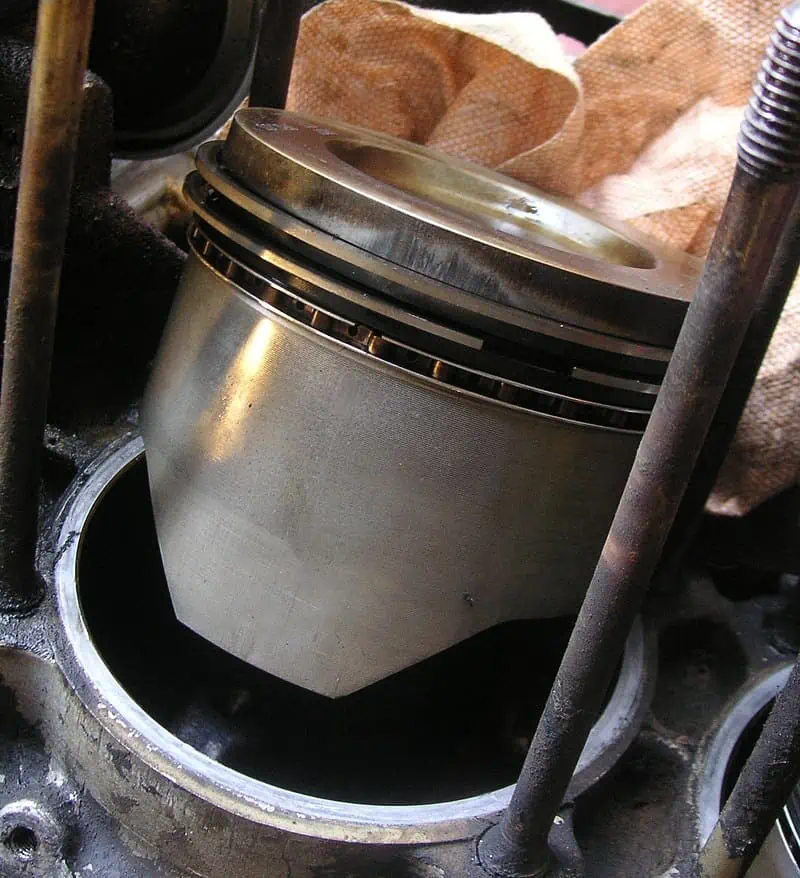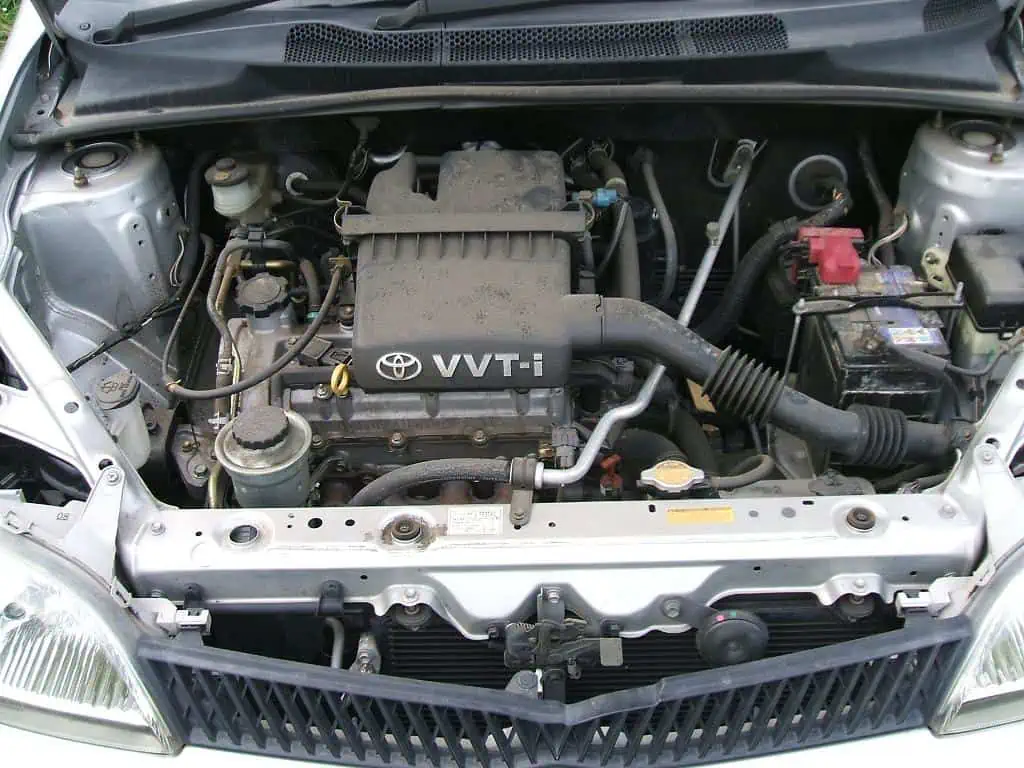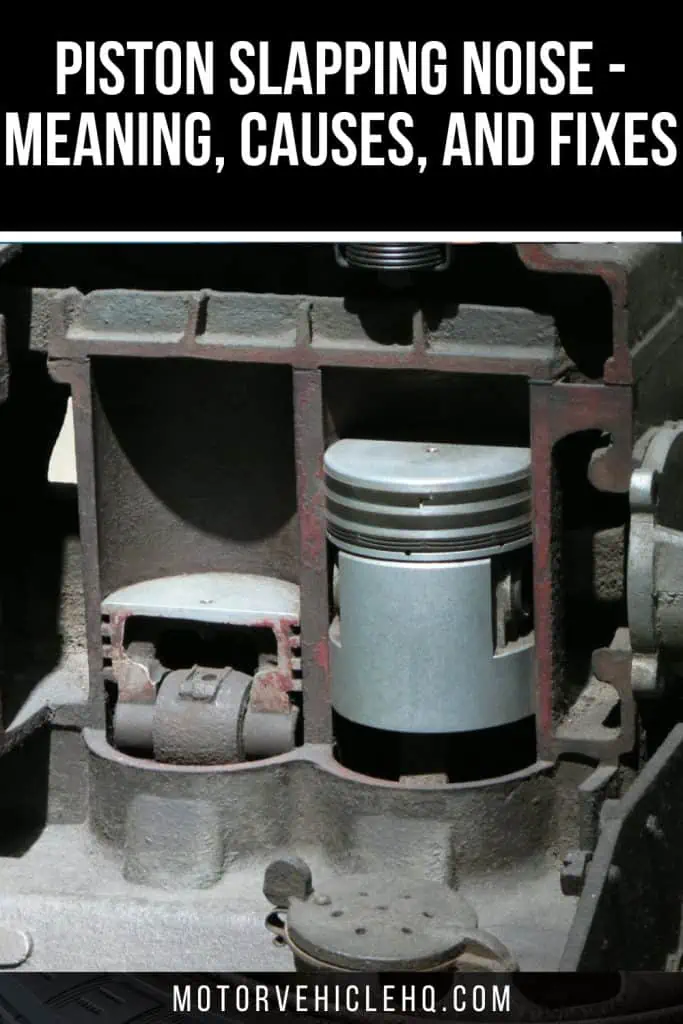At some point, every car makes some noise. But occasionally, that noise can be anything to worry about. A piston slapping noise may be what you’re hearing if your engine is making a banging noise. However, what does piston slapping noise sound like?
The piston makes a piston slapping noise when it bumps into the cylinder wall, which happens when there is a large space between the two. The noise is best described as sounding like your gasoline engine abruptly switched to diesel.
A piston slapping noise is typically a sign of engine wear and tear, and it should be taken seriously. But if it’s bad enough, it might eventually harm the engine. So, just to be cautious, it’s preferable to have it examined by a specialist.
Piston – Definition
Internal combustion engines of the present day, or ICEs for short, are four-stroke engines. This indicates that each cycle has four stages: intake, compression, power, and exhaust.
Your engine will use the intake valve to draw gasoline and air into the cylinder during the initial phase. The piston will descend at this point to induce suction inside the cylinder.
The cylinder will then start its compression stroke. The fuel and air mixture will now be compressed as the piston moves higher, preparing it for combustion, which will start the power stroke. Fuel and air will combine to produce a controlled explosion at the power stroke.
Spark plugs are used to ignite fuel in gasoline engines, which is how combustion occurs in these vehicles. The explosion is started by a little electric spark that the spark plug’s tip produces. In contrast, a diesel engine produces combustion by using its high compression alone, without the assistance of a spark plug.
The explosion that results from the fuel and air mixture ignited forces the piston downward once more. The power stroke is so named because this will cause the crankshaft that drives your car to turn as a result.
Pistons within a sectioned petrol engine by 160SX / CC BY-SA 3.0. When the piston collides with the cylinder wall—which occurs when there is a big gap between the two—it generates a piston slapping sound. It sounds like your gasoline engine suddenly swapped to a diesel one, which is the best way to explain the noise.
Your piston will then raise once more to force the burned gas out through the exhaust valve. After that, the procedure starts over with the intake stroke.
What Role Do Pistons Play In a Car’s Overall Functionality?
You might be asking why pistons are used. Inside the engine block, a piston is a cylinder that moves up and down. How does this motion happen?
Inside the combustion chamber, a mixture of air and fuel will erupt, moving the piston up and down as a result. Additionally, a wrist pin is attached to the piston. This has connections to more engine components.
How many chambers do the majority of automobiles have? Most automobiles have four, six, or eight chambers. Up to 12 chambers can be found in some of the newer, quicker automobiles. Even though automobiles have numerous chambers, only one chamber can support combustion.
The combustion chambers generate a lot of heat. Because the pistons are light, they may move more easily. These days, they are frequently made of an aluminum alloy that makes it easier for them to move up and down the cylinder. Cast iron was once the primary material used to make pistons. This substance was chosen because it could withstand the added heat.
The pistons and piston rings are part of this mechanism. Compression ring seals are employed to fill the gap left by the piston and cylinder’s imperfect fit. Smoke will begin to release as these rings begin to fail if they are allowed to deteriorate over time.
The oil ring is another component of this apparatus. This component combines two rings. It is employed to clean the cylinder wall of extra oil. This is crucial to prevent oil buildup inside the engine.
If these rings deteriorate, the combustion chamber will begin to leak oil. Future difficulties could result from this in a very severe way. To prevent total engine damage, you should make sure this is addressed as soon as feasible.
A Piston Slapping Noise: What Is It?
Okay, so now that you are familiar with how an engine operates, it will be simpler for you to comprehend what a piston slapping noise is and why it occurs. Your car’s pistons cram themselves tightly into the cylinder, leaving very little space between them and the cylinder walls.
This is acceptable because the side-to-side movements required by pistons to move up and down are minimal. This also aids in preventing the escape of the fuel and air combination.
Due to heat and friction, the piston and cylinder wall may deteriorate over time. There will be increased space between the piston and the cylinder wall as they deteriorate. The piston will then start to rock in the cylinder, causing the skirt (the cylindrical piston wall) to slap the engine’s cylinder wall.
The engine will then start to rattle or knock as a result of this. Typically, this occurs when the engine is running at idle or during overrun (when you let off the throttle and the engine’s RPM drops).
A four-piston engine by Wapcaplet / CC BY-SA 3.0. A piston slapping sound is often an indication of engine deterioration and needs to be handled seriously. But if the situation persists, the engine could eventually suffer damage. So it’s best to have it evaluated by a professional just to be safe.
A piston slapping noise is more common in some engines, particularly those with aluminum cylinder blocks or pistons. To reduce weight, aluminum is frequently utilized in some performance cars because it is lighter than iron.
Additionally, it does a better job of transmitting heat to the coolant, which keeps the engine from overheating. Aluminum engines are more prone to piston slapping noise since they aren’t as sturdy as cast iron, which is heavier but more lasting.
Why Does Piston Slapping Noise Occur?
Since there is a lot of space between the piston and the wall, the piston rocks may move from one side to the other. There will be a piston slapping noise as a result. Aluminum blocks are more susceptible to this issue than blocks made of other materials.
The pistons will accelerate if they have more cold clearance. The piston ultimately shifts from the minor to the major thrust side as a result, producing a piston slapping noise.
Modern automobiles feature a specific sensor that alerts the vehicle’s ECU system to any fluctuations in the piston, which is a crucial point to remember. To prevent the car’s engine from falsely knocking, the ECU will pull ignition timing from its system.
If you don’t have this mechanism, you can alternatively modify the piston’s motion using an offset pin. What will that achieve? The piston won’t be able to strike the cylinder because of it.
What are the Common Symptoms of Piston Slapping Noise
Other than a knocking sound coming from your engine, there are no other signs of piston slapping noise. It is unlikely that you will experience a decrease in performance or bad fuel economy. It’s doubtful that a piston slapping noise will be heard in a car that is quite recent.
This is due to the ECU module, or Engine Control Unit, that is now standard in current cars. To ensure that the engine can function smoothly, the ECU makes several adjustments to the engine using several sensors.
For instance, the engine will adjust by injecting extra fuel to make up for a lack of oxygen so that it can continue to run. The engine will run perfectly for a while until the air intake issue needs to be fixed.
A knock sensor is one of these sensors; it functions almost like an ear for the ECU, listening for unusual noises and vibrations originating from your engine.
The engine’s ignition timing will then be modified by the ECU to get rid of the uneven knock. Later, we’ll cover the potential causes of engine knocks in greater detail.
When something is unusual, the ECU will also send a signal to the check engine light to turn it on. This implies that before the piston slapping noise even happens, it will alert you to an issue so that you can rectify it.
The only way to confirm the existence of a piston slapping noise is to disassemble your engine and examine the pistons. We don’t advise doing this unless the knocking sounds are accompanied by other symptoms because it will take a lot of time and money.
For instance, piston slaps may be the reason for a timing belt that has broken. But in most cases, this is due to aging or a seizure related to a water pump. Furthermore, if your car’s timing belt is older than ten years, it should already be replaced.
Pistons of Hydraulic cylinders used in a hot press by Seedlesslime / CC BY-SA 4.0. Some engines, especially those with aluminum cylinder blocks or pistons, are more likely to make a piston slapping noise. Aluminum is often used in some performance cars to save weight because it is lighter than iron.
There is nothing you can do to confirm a piston slap other than to disassemble the engine and personally inspect the pistons.
Are Piston Slapping Noise Dangerous?
Online, there is a lot of discussion over whether or not the piston slapping noise is dangerous. However, most experts agree that you shouldn’t worry too much about the piston slapping noise, at least not right away.
If the engine is making a knocking noise, you can still drive with a piston slapping noise, but it could be uncomfortable and annoying. Long-term, they might do more harm to the engine, but it’s not a significant deal.
We advise keeping an eye on your car’s exhaust emissions. An oil leak into the engine may result from the piston rings degrading more quickly as a result of a piston slap. Blue smoke will come from your exhaust pipe when oil spills into the engine’s cylinder and is burned together with the gasoline and air mixture.
If this occurs, you will have to swap out the piston and rings. If it isn’t fixed, other parts, like the catalytic converter, will sustain greater harm.
How Is the Piston Slapping Noise Diagnosis Done?
Often, if you have failed pistons, the check engine light will come on. This will activate to let you know that there is a problem with your car. An error code will be present if the vehicle has a diagnostic system.
You can identify the source of the problem with the aid of this error code. The misfiring cylinder will be identified by the error code. A damaged sensor may occasionally result in a misleading readout.
These sensors are essential for informing the system whether or not there is a problem. The diagnostic system will be alerted by the sensors, and that system will then switch on the engine light.
The cause of misfires There are a variety of reasons why this might occur. Poor spark plugs, unclean fuel injectors, bad ignition coils, and bad spark wires are a few of these causes. It’s crucial to understand that those components won’t result in the piston slapping.
However, the exhaust system will create blue smoke as a result of those components. If this blue smoke is formed, it could be harmful to the atmosphere as well as to human health. There are often toxic chemicals in this smoke.
1. Timing Belt Snapping
What is a timing belt, exactly? Every car needs a timing belt, which is a vital component. It assists in fine-tuning the motion of the valves and pistons. So, what occurs if the belt breaks might be on your mind?
In either case, the pistons and valves will collide. For the health of your engine system, avoid this. You must have this issue rectified as soon as possible because it will lead to other engine problems.
A timing belt is being installed by Petar Milošević / CC BY-SA 3.0. Timing belts are essential parts that are required for every automobile. It helps to adjust how smoothly the valves and pistons move. Both scenarios result in a collision between the pistons and valves, which sounds like slapping pistons. Avoid doing this for the sake of your engine system. This problem needs to be fixed right now because waiting will only cause further engine issues.
2. Damaged Piston Rings
Nearly every component of the engine system experiences wears and tear over time. If the piston rings have gone a long time without being changed or maintained properly, they will eventually begin to wear down. When this occurs, air will move between the cylinder and the piston’s spaces.
Additionally, the oil will begin to seep into these areas and descend to the firing chamber. This is quite bad if it happens. The vehicle will emit white smoke and consume a significant amount of engine oil.
If you continue to ignore this, your engine system will suffer damage. Oil in locations where it shouldn’t be is hazardous. If you spot a problem with your car’s engine, always have it serviced.
3. Blown Pistons
To prevent faulty auto parts and repairs, it’s crucial to maintain your vehicle properly. The piston will begin to develop holes if the fuel injections take in too much dirt. The material will deteriorate and develop holes due to the dirt.
Whether you open up your engine, you can see if there is a problem. Your system won’t function properly and you risk hearing the piston slapping noise if you discover holes in your piston. This issue needs to be rectified right away.
How Can I Fix the Piston Slapping Noise Problem?
As previously said, the piston slapping noise isn’t immediately alarming. But when you see further signs, such as smoke coming from the exhaust, it’s time to fix the engine.
Your only true choice at this stage is to rebuild the engine. The engine must be disassembled, all worn-out and broken components must be replaced with new ones, and the engine must then be rebuilt.
Rebuilding an engine is expensive. To save on expenses, you can get away with replacing a small number of parts. For instance, if you simply need to replace the piston rings, it will only cost you about $200 for a set, and for other automobiles, it will be even less. However, this will still set you back $1,000 to $2,000 due to the labor costs.
An engine’s disassembly and rebuilding require a lengthy, difficult process that often takes 10 hours to complete. Because of this, we advise that you perform a complete rebuild and replace all necessary parts at the same time. Your engine will operate flawlessly with this.
Since engine rebuilds in some cars can cost as much as $4,500, this isn’t an option for everyone. You would be better off selling the automobile and using the proceeds to purchase a new vehicle if this wasn’t an option.
The fact that the car is officially damaged means you will have to sell it for less money. But at least you’ll have money in your hands after this.
To save money, we don’t advise anyone who isn’t a certified professional technician to perform an engine rebuild themselves.
Rebuild the Car Engine
You must determine whether an engine rebuild is necessary before proceeding and whether it would be preferable for you to simply sell the vehicle. We advise selling your car as-is if the rebuild’s price isn’t too far off its market value.
Spring-loaded piston rings by Interiot~commonswiki / CC BY-SA 2.0. Every part of the engine system eventually faces wear and strain. The piston rings will ultimately start to deteriorate if they have gone an extended time without being changed or maintained properly. When this happens, air will flow between the gaps between the cylinder and the piston.
We do, however, have some advice if it’s still worthwhile or if you still want to maintain your car for nostalgic reasons.
The first step is to compare prices so you can acquire the best one. It’s crucial to have a reputable auto repair shop handle this because it’s expensive and highly invasive repair work.
For you to be certain that the repair business won’t charge you for something you don’t need, do as follows.
Reminding the mechanic to get in touch with you before replacing or repairing an item that wasn’t included in the first estimate or quote is also a smart idea.
You can then give your approval or disapproval of the work they are about to perform. Additionally, you won’t be taken aback by unspecified repair work when you receive the bill.
Finally, finding replacement parts on your own may be more cost-effective if you have a thorough understanding of engine components.
You might be able to get parts cheaper elsewhere since auto repair firms sometimes charge more for certain parts. Remember that not all auto repair shops will fix your automobile if the part is not from them.
Can Thicker Oil Eliminate the Piston Slapping Noise?
The piston rings frequently fail to seal properly, which results in a piston slapping noise. This can be the result of damage, wear, or a manufacturing flaw. Thicker oil may assist to lessen the piston slapping noise, but it won’t necessarily stop it.
The simplest solution to avoid piston slapping noise is to give your car regular maintenance and swap out any worn or broken parts. Bring your car to a professional for analysis and repair if you believe it is making a piston slapping noise.
How Long Can an Engine Run with a Piston Slapping Noise?
Some engines can operate for over 100,000 miles while making a little piston slapping noise. Only 30,000 to 40,000 miles will be covered by some before they need to be rebuilt.
A piston slapping noise is not typically a sign of a failing engine. However, it might result in more use of oil and perhaps worsen fuel efficiency and performance.
Do Vehicle Manufacturers Provide a Warranty for Piston Slapping Noise Problems?
Since piston slapping noise is seen as a wear-and-tear issue, it is typically not covered under warranty. However, it’s worth asking the dealership if they will cover the cost of repairs if your car is still covered by the manufacturer’s guarantee.
How Can You Differentiate Between a Rod Knocking Noise and a Piston Slapping Noise?
A piston slapping noise and a rod knocking noise can be distinguished in a few fundamental ways.
A typical car engine by Carolla / CC BY-SA 3.0. Before moving forward, you must decide whether an engine rebuild is required to solve the piston slapping sounds and whether it would be better for you to just sell the car. If the rebuild’s price isn’t too far off from the car’s market worth, we advise selling it as-is.
First off, an engine will typically make a rod knocking noise when it is under load or when it is revving more quickly than usual. On the other hand, piston slapping noise can occur whenever it wants, regardless of load or engine speed.
Second, as the damage to the connecting rods gets worse over time, the rod knocking noise will typically get worse as well. However, piston slapping noise usually doesn’t change much over time and doesn’t necessarily get worse.
Additionally, piston slapping noise frequently sounds like a bang inside the engine, while rod knocking noise typically produces a deep knocking sound resembling metal hitting metal.
The Conclusion
To summarize, the piston slapping noise is a banging sound that is produced when the pistons slam into the cylinder wall due to an excessive amount of clearance between the two parts. A piston slapping noise typically doesn’t indicate a problem because it won’t harm other parts right away.
Additionally, it is not cost-effective to replace the pistons simply because you hear a piston slapping noise because you will need to rebuild the engine.
Make sure nothing else is the cause of any engine knocking noises you may be hearing. If the knock sensor, the ignition timing, or the rod bearings are malfunctioning.
However, if it’s a piston slapping noise, you usually don’t need to be concerned unless other indicators, like blue exhaust smoke, are present.
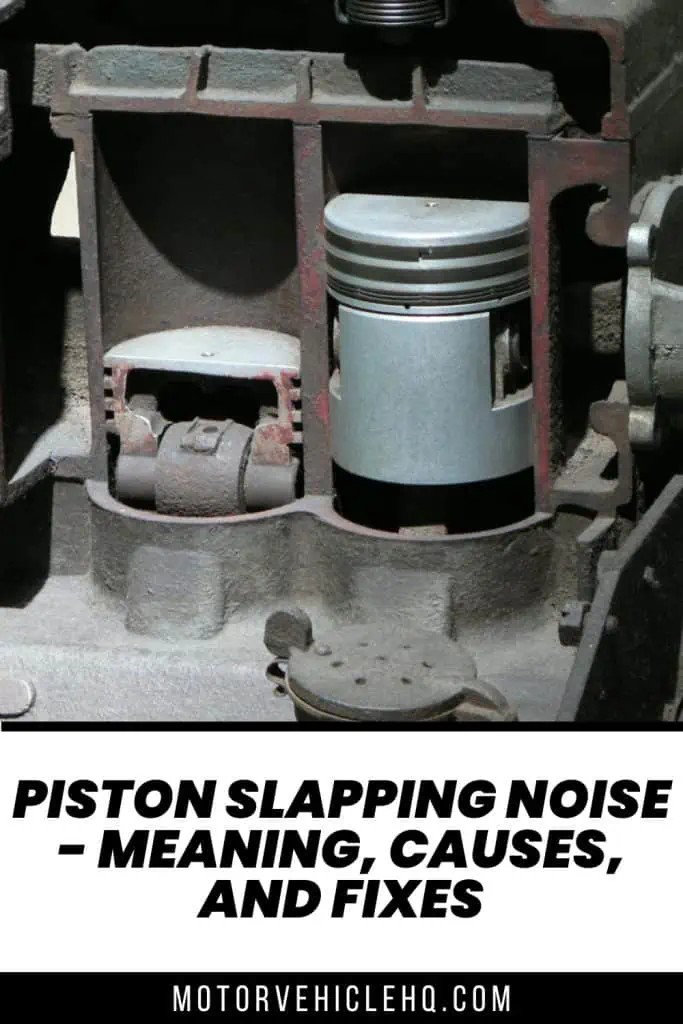
Pistons within a sectioned petrol engine by 160SX / CC BY-SA 3.0

Jim Wicks is the founder of MotorVehicleHQ. With over two decades of experience in the automotive industry and a degree in Automotive Technology, Jim is a certified car expert who has worked in various roles ranging from a mechanic, car dealership manager, to a racing car driver. He has owned more than 20 cars over the past 15 years. Ask him about any vehicle you see on the road and he can tell you the make, model and year. He loves the aesthetics of all things cars, and keeps his vehicles in pristine condition.
In his free time, Jim enjoys getting his hands dirty under the hood of a classic car or taking long drives along the country roads. His favorite car? A 1967 Shelby GT500, a true classic that, according to Jim, “represents the pure essence of American muscle.”
